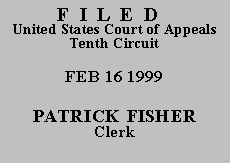

| UNITED STATES OF AMERICA, | No. 98-1347
(D.C. No. 98-M-1666) (D. Colo.) |
On October 16, 1998, Scarborough filed an application for a certificate of appealability and a motion to proceed in forma pauperis on appeal with this court. Scarborough's application for a certificate of appealability before this court asserts the same four errors considered and rejected by the district court. Scarborough claims:
1) That his trial counsel rendered ineffective assistance "when he unwittingly relieved the government of its burden of proof," in violation of the Sixth Amendment to the United States Constitution;
2) That government agents mishandled evidence resulting in a violation of Scarborough's due process rights;
3) That the government failed to turn over exculpatory evidence in violation of Brady v. Maryland, 373 U.S. 83 (1963), and the Fifth and Fourteenth Amendments to the United States Constitution; and
4) That "[t]he district court failed to require the government to prove, beyond a reasonable doubt that there was territorial jurisdiction to try the criminal case in a legislative territorial court created under Article IV, Cl. 2 of the Federal Constitution."
Scarborough failed to raise the first, second, and fourth issues either at his trial or on direct appeal. In order to excuse his "double procedural default," Scarborough must show "cause" and "actual prejudice" resulting from the errors about which he complains. See United States v. Frady, 456 U.S. 152, 167-68 (1982). After careful review of the record, construing his pro se pleadings liberally, see Haines v. Kerner, 404 U.S. 519, 520-21 (1972), we have determined that Scarborough has failed to meet his burden under Frady.
Scarborough's third issue, his Brady claim, has previously been resolved by this court. In resolving Scarborough's direct criminal appeal, we held the very evidence that Scarborough now claims the government withheld in violation of Brady was ultimately disclosed to him at trial, that his counsel "extensively cross-examined [the government's forensic expert] regarding the tardily-disclosed evidence," and that his counsel "used the evidence to strong effect in his closing argument." Scarborough, 128 F.3d at 1376. In short, we held that Scarborough failed to meet Brady's materiality standard. Id. We reject the invitation to overrule our earlier decision based on the exact same facts presented by the identical party.
Accordingly, we DENY Scarborough's application for a certificate of appealability. Moreover, because we find that Scarborough's appeal is frivolous and fails to present a substantial question, we DENY his motion to proceed in forma pauperis.
The mandate shall issue forthwith.
ENTERED FOR THE COURT
David M. Ebel
Circuit Judge
*.After examining appellant's brief and the appellate record, this panel has determined unanimously that oral argument would not materially assist the determination of this appeal. See Fed. R. App. P. 34(a)(2) and 10th Cir. R. 34.1(G). The case is therefore ordered submitted without oral argument. This Order and Judgment is not binding precedent, except under the doctrines of law of the case, res judicata, and collateral estoppel. The court generally disfavors the citation of orders and judgments; nevertheless, an order and judgment may be cited under the terms and conditions of 10th Cir. R. 36.3.